The time for experimentation and rotation is over, and at long last, the Springbok coaches look set to show their tactical hand for the Rugby World Cup quarter-finals.
Rassie Erasmus and Jacques Nienaber have made good on their promise to develop squad depth this season, and now face several brutal selection decisions for the most important fixture of this four-year cycle. No matter what they decide, two or three world-class players may well end up watching the Springboks tackle France from the Parisian stands this weekend.
While it’s a good problem for any coach, some personnel calls could alter South Africa’s approach, and ultimately its destiny.
So many players are hitting form. Hander Pollard and Lukhanyo Am are back from recent injuries. Selecting a match-day 23 looks fiendishly tough.
Former captain Victor Matfield summed it up best in the wake of the win over Tonga in the team’s last pool match: the Boks have yet to settle on combinations, creating more questions than answers.
Who is South Africa’s best fly-half? Who should start in the back-row, midfield, or back three in the do-or-die match? Should the coaches favour a 5-3, 6-2 or even a 7-1 split on their bench? What do selections across 2023 tell us about the pecking order?
Perhaps more should be read into the “marquee” games. Generally, the best available side was selected for the matches against New Zealand (Auckland and London), Argentina (Johannesburg), Wales (Cardiff), Scotland (Marseille) and Ireland (Paris).
Handre Pollard vs Manie Libbok
In 2018 and 2019, the Boks had two fly-half options in Pollard and Elton Jantjies, with the latter playing no part in the World Cup knockout phase in Japan.
Since 2021, however, they have used six players in this position. Three – Manie Libbok, Damian Willemse and most recently Pollard – have worn the number 10 jersey in France.
Pollard’s recent comeback has prompted a fierce debate about who should start this weekend. The Boks need a reliable goalkicker, and having done the business in 2019 – and achieved an 88% success rate in 2022 pre-injury – Pollard is the obvious choice.
That said, Libbok stepped up during the established pivot’s absence. He shone against Scotland, and nailed three successive goals in the second half of the Tonga match. But wayward kicking in the blockbuster loss to Ireland attracted heavy fire. Bok selectors face a potentially campaign-defining call.
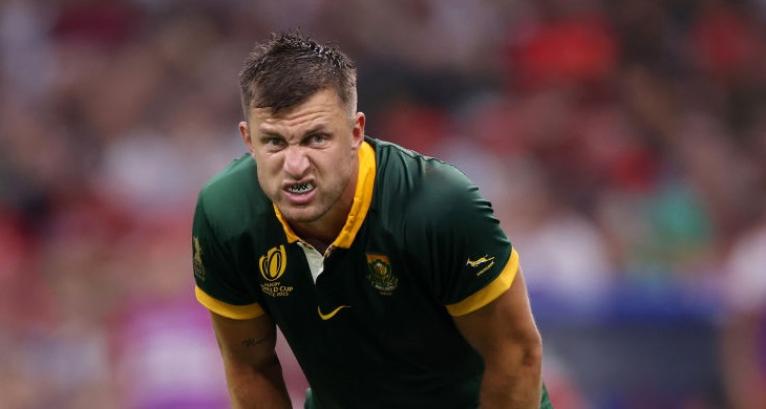
Libbok has at been at the heart of South African rugby’s attacking revolution, be it in a Stormers or national jersey. If the Boks intend to play a more expansive game in the quarter-final, then Libbok rather than Pollard may be the better bet.
But in a winner-takes-all showdown, the Boks may opt for consistency. Pollard is the stronger kicker, from hand and in front of the posts. While he doesn’t have Libbok’s passing game, he’s a powerful ball-carrier and defender. His standing as a leader within the group, and his ability to amplify those around him, should not be underestimated.
There are two big decisions to be made here. If Pollard starts, and if Willemse and Willie le Roux are also in the matchday squad, will the Boks need Libbok on the bench?
Two of those four players are likely to miss the cut, especially if the Boks favour a 6-2 bench.
Faf de Klerk vs Cobus Reinach
Have the coaches settled on their starting scrum-half, as well as their starting half-back duo?
Faf de Klerk seems the obvious choice, given his kicking and defensive strengths, although Cobus Reinach has been impressive of late. Last year, Jaden Hendrikse was first choice ahead of De Klerk, before sustaining an untimely injury.
Grant Williams won’t be a starting option unless there are injuries, but may provide utility value from the bench. The explosive Reinach is equally capable of fulfilling that scrum-half-cum-winger role.
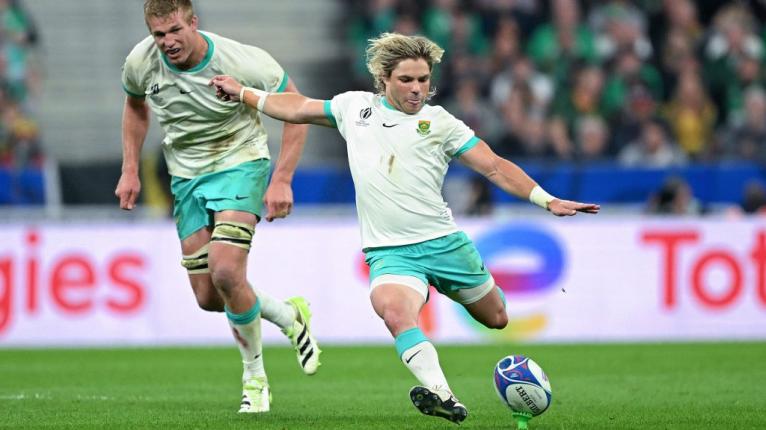
De Klerk and Libbok have started three matches in tandem this season (against New Zealand in Auckland and London, and more recently against Ireland in Paris) and are the most used half-back combination.
The coaches will be tempted to revisit the De Klerk-Pollard partnership, which has proved so successful over the years, but may be concerned De Klerk and Pollard haven’t played together since August last year.
Lukhanyo Am vs Jesse Kriel
Am has been one of the Boks’ stand-out performers over the past five years, perhaps the finest centre in the world over that period. But for an untimely knee injury sustained against Argentina two months back, he would have been an automatic pick at 13.
The Bok camp have taken a scientific approach to managing Pollard and Am. The fly-half has made a full recovery from his calf ailment and should go the distance. Am was recalled in the wake of Makazole Mapimpi’s tournament-ending injury last Sunday, but it remains to be seen if he will be fast-tracked to the starting team, since he hasn’t played competitive rugby since August.
This is one gamble the Bok coaches may be willing to take.
Am has developed a reputation for game-breaking contributions in the most high-profile matches. He is a key defensive leader, and that defence will lay the platform for the team’s performance.
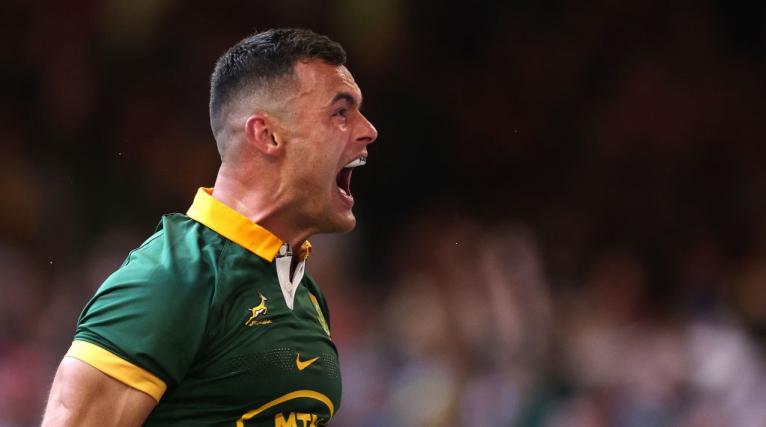
Here’s where it gets brutal. Starting Am means axing Jesse Kriel, who has been one of South Africa’s best players in France.
Kriel has led the defensive rush from the outside channels, and has also produced a few special plays in attack. Despite playing some of the greatest rugby of his career, and his substantial experience, Kriel may find himself dropped altogether.
He has done nothing to deserve this, yet one would understand if the coaches back their returning totem.
Damian de Allende and Am forged a highly successful partnership over the past six years. While calls for Andre Esterhuizen’s elevation have grown louder and louder, it’s hard to recall when De Allende last failed to deliver. He is in pole position to start at 12.
Damian Willemse vs Willie le Roux
Like Pollard, Le Roux is another player better known for his leadership and ability to enhance the collective rather than his own individual brilliance.
In the twilight of his career, the veteran receives widespread recognition for his assists, and how he marshals the team from the backfield.
Nevertheless, Willemse has established himself as the favourite. While he was touted as a long-term successor to Frans Steyn, who covered all backline positions bar scrum-half from the bench in 2019, he has developed into a world-class starter.
The coaches have used both players across the big matches this season, but preferred Willemse for the key clashes against Scotland and Ireland at the World Cup. Much will depend this week on who is chosen on the wings, and the balance of the back three.
Cheslin Kolbe vs Kurt-Lee Arendse vs Canan Moodie
The Boks have selected Kurt-Lee Arendse with Cheslin Kolbe in three matches this season. That raised a few eyebrows, given the pair’s lack of height, and the quality aerial skills of their opposition.
Though the diminutive duo are counterattacking phenomena, and have shown no frailties under the high ball, they would face a French side renowned for its kicking game.
Mapimpi’s departure has cut the Boks’ options, with the only alternative 20-year-old Moodie. If they want to adopt a pragmatic approach, with accurate box kicking and aerial pressure, they may back the taller, younger man.
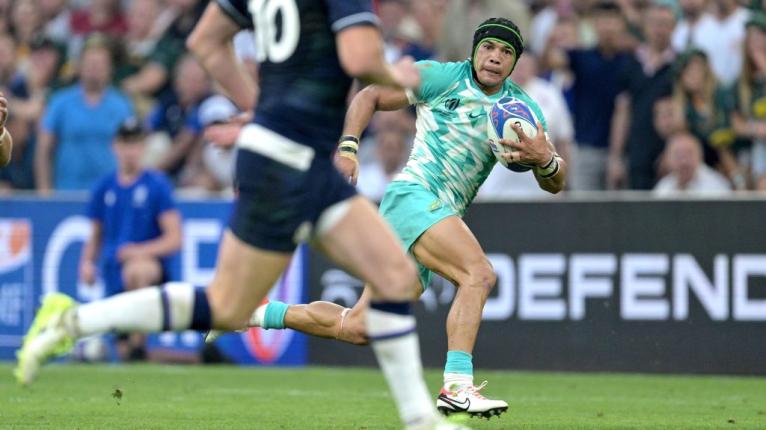
Then it could come down to a choice between Kolbe or Arendse for the other berth. Kolbe is the more experienced and established player, but Arendse has been particularly prolific since making his debut last year, scoring 12 tries in 12 Tests.
Perhaps Kolbe’s experience and goalkicking prowess will earn him a place. Either way, you’d have to feel for the player who is omitted, as they could well join Kriel and others in the stand.
Jasper Wiese vs Duane Vermeulen
One of the most debated head-to-heads. Duane Vermeulen wasn’t at his best in 2022, but regained form during the early stages of 2023, and has continued to motor in France.
The Bok coaches have selected Wiese at number eight in four of the six big games to date. The abrasive Leicester Tiger snarled with ball in hand against Scotland and Ireland, and was a titan in defence.
The Boks weren’t at their best at the breakdown in the latter game, and may benefit from Vermeulen’s contribution on the floor. They will surely hope to unleash their maul in the quarter-final, and may need the old timer on board to stop the French deploying their own proficient driving effort from set-piece. His presence is bound to lift those around him.
Trevor Nyakane vs Vincent Koch
The injuries to lock Lood de Jager and hooker Malcolm Marx have changed the dynamics of the starting pack, as well as the bench.
The front-row combination of Steven Kitshoff, Marx and Frans Malherbe has been preferred for big matches, while Ox Nche, Mbonambi and one of Trevor Nyakane or Vincent Koch has spearheaded the Bomb Squad.
Marx’s departure meant Mbonambi starting and utility forward Deon Fourie covering hooker from the bench.
Do the Boks continue with Nyakane as the reserve tight-head, ahead of Koch? Nyakane has played for Racing 92 in Paris since 2021, and will have an intimate knowledge of the French setup and mentality. On that basis, he may even be considered a starting option.
The decision to select both Malherbe and Nyakane would limit South Africa in other ways. Koch offers something extra as a breakdown contester and ball-carrier when the game opens up.
Five-three bench vs six-two bench
In 10 games this season, the Boks have used the 5-3 split four times, the 6-2 four times, and the somewhat controversial 7-1 twice.
It would be a surprise to see the Boks moving away from their forward-centric strategy at this stage of the World Cup. A 6-2 split seems likely, although you wouldn’t put it past Erasmus and Nienaber to revisit the 7-1 formation.
The coaches favoured a 5-3 against France last November, and some might feel the ploy worked, even though the Boks fell short of winning. The pack was reduced to seven men following Pieter-Steph du Toit’s 12th-minute red card, yet produced a gladiatorial performance. With uncertainty around Pollard and Am’s fitness, as well as Libbok’s goalkicking, the Boks may well opt for the insurance of an extra back.
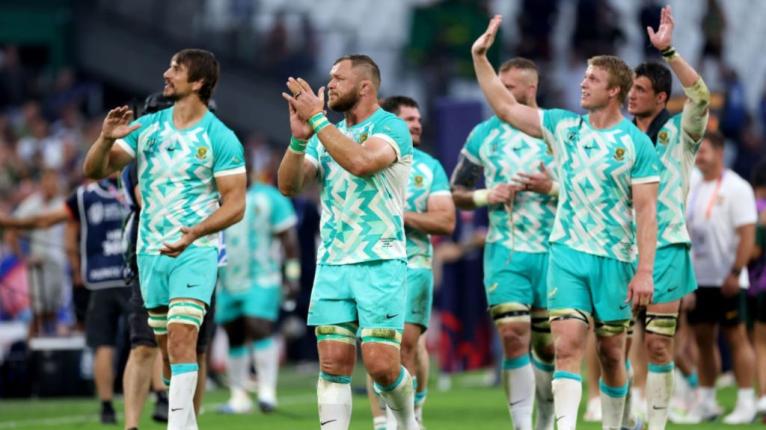
Or they could go all-in on the forward-dominant strategy which has yielded significant reward. If so, they would have to choose between an extra lock or back-row.
If Kolisi or Vermeulen – who completed 80 minutes against Tonga – can go the distance, then they could select an entire second tight-five on the bench.
South Africa will have a significant advantage if enormous locks RG Snyman and Jean Kleyn enter the contest in the second half. The Boks would have the means to maintain their momentum at the set-pieces or address any shortcomings.
A brutal yet necessary selection meeting awaits. The decisions taken by the coaching staff this week will shape the fate and legacy of the defending champions.



Wow, that is some very impressive talent they have at their disposal! With those backs I'd definitely be going with Mannie over pollard to set them alight
‘Brutal’ seems a dramatic term? Building depth is key, and this gives options for each game. Picking the right guy for a game might not equate to the best person in a position.
No thought of the 8-0 bench experience?
I don't really care who plays. The Boks will bring it physically to the french. I expect the pack to be the same players as in 2022 when France beat the Boks, with only Kitshoff starting ahead of Nche.
Not so sure if Rassie/Jacques wil "drop" Libbok.
Willemse started at 10 in Nov 22 & Willie at Fullback which won't be the case come Sunday.
I won't be suprised if we see Pollard at 12 and Libbok at 10 with De Allende moving to 13. But then again its a new combinatin.
Dont agree Pollard's kicking out of hand is better than Libboks, i believe the net position is Libbok edges it - the trend is high-scoring games and its going to continue, Boks need Libboks attack and its clear his place kicking is improving. Manie could easily be the player of the tournament. The bench split is the biggest conundrum and i think coaches will continue horses-for-courses approach. Hope Eskom delivers at hooker as required.
Lessss go! 2 Mean Green machines this weekend 💪
If it's the conventional test approach - take all points on offer, then Handre will start at 10. If, however, you see Libbok starting w Handre on the bench and a 7:1 split (w Kwagga) then you know the Boks are going to apply the suffocating first half pressure routine, the one that smothered the ABs to great effect some weeks back ...
You have the team spot on, anything else will be a big surprise.
Start with Manie and have Holhaar on the bench. If Manie's boot misfires, pull him or DDA early and get HP on. This will work with a 6/2 and a 5/3 split. Easy peasy.
Well with the boks policy we shouldnt have to wait long as they normally announce pretty early.
I dont gamble but if I did I still wouldnt bet on the chosen line up.